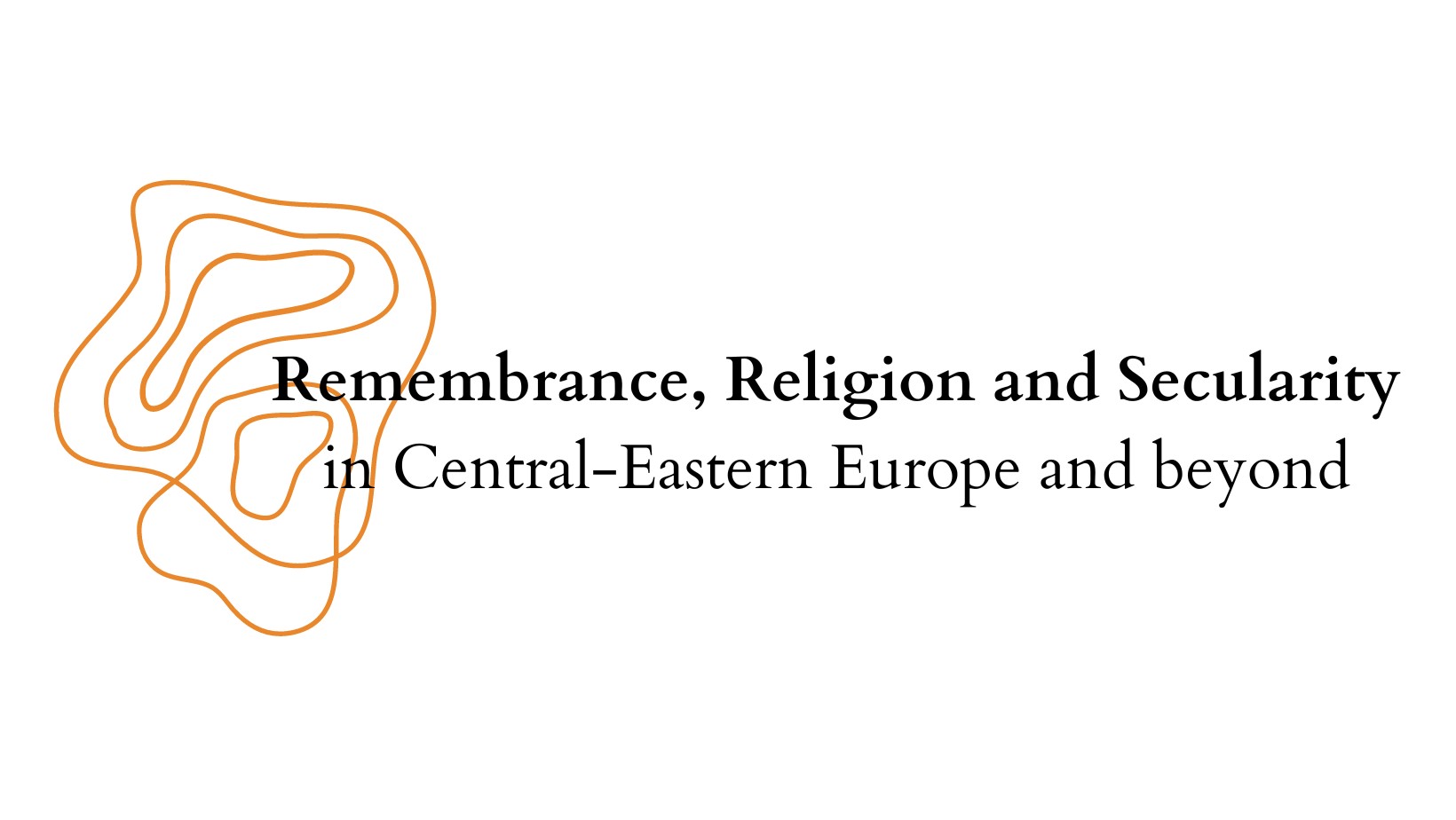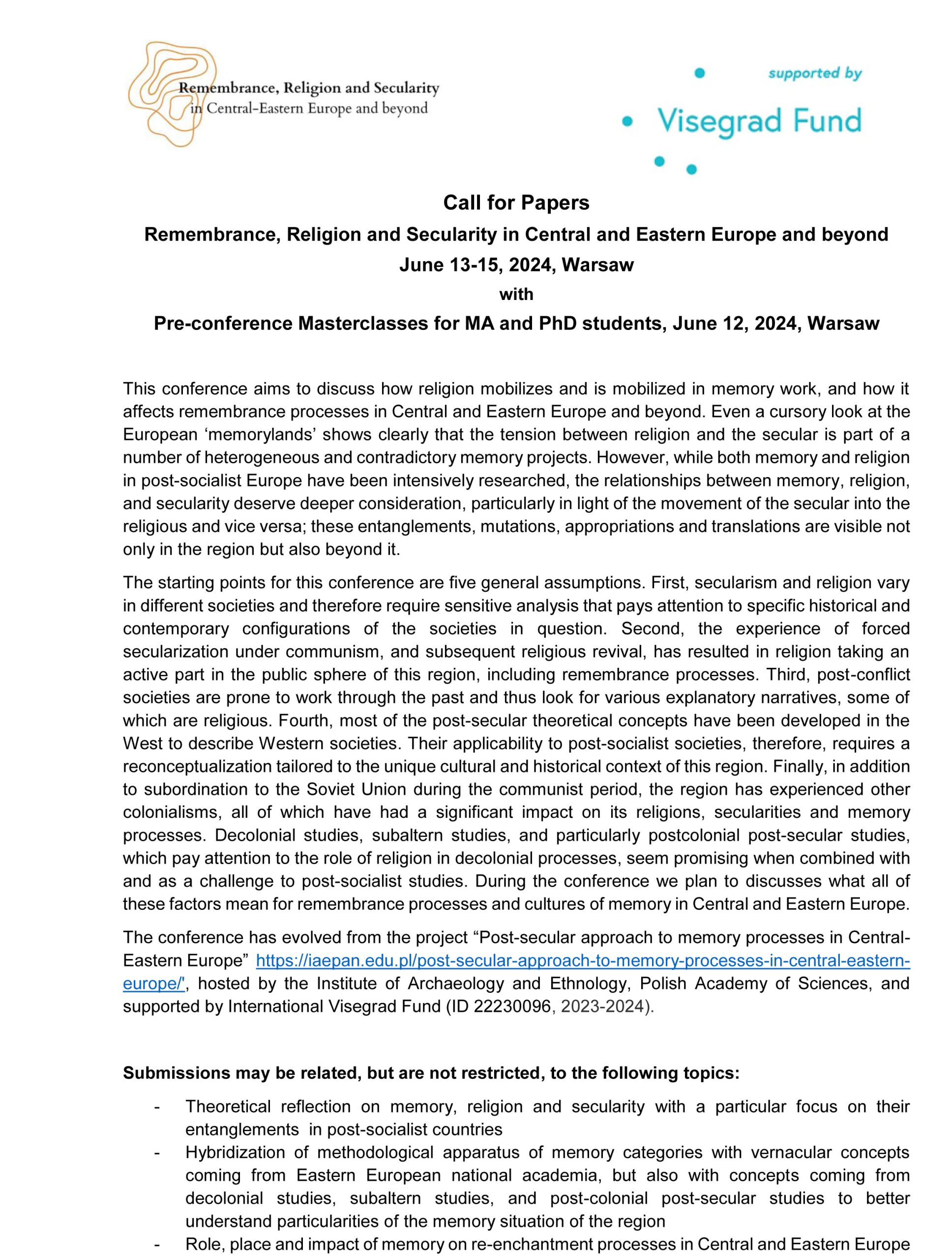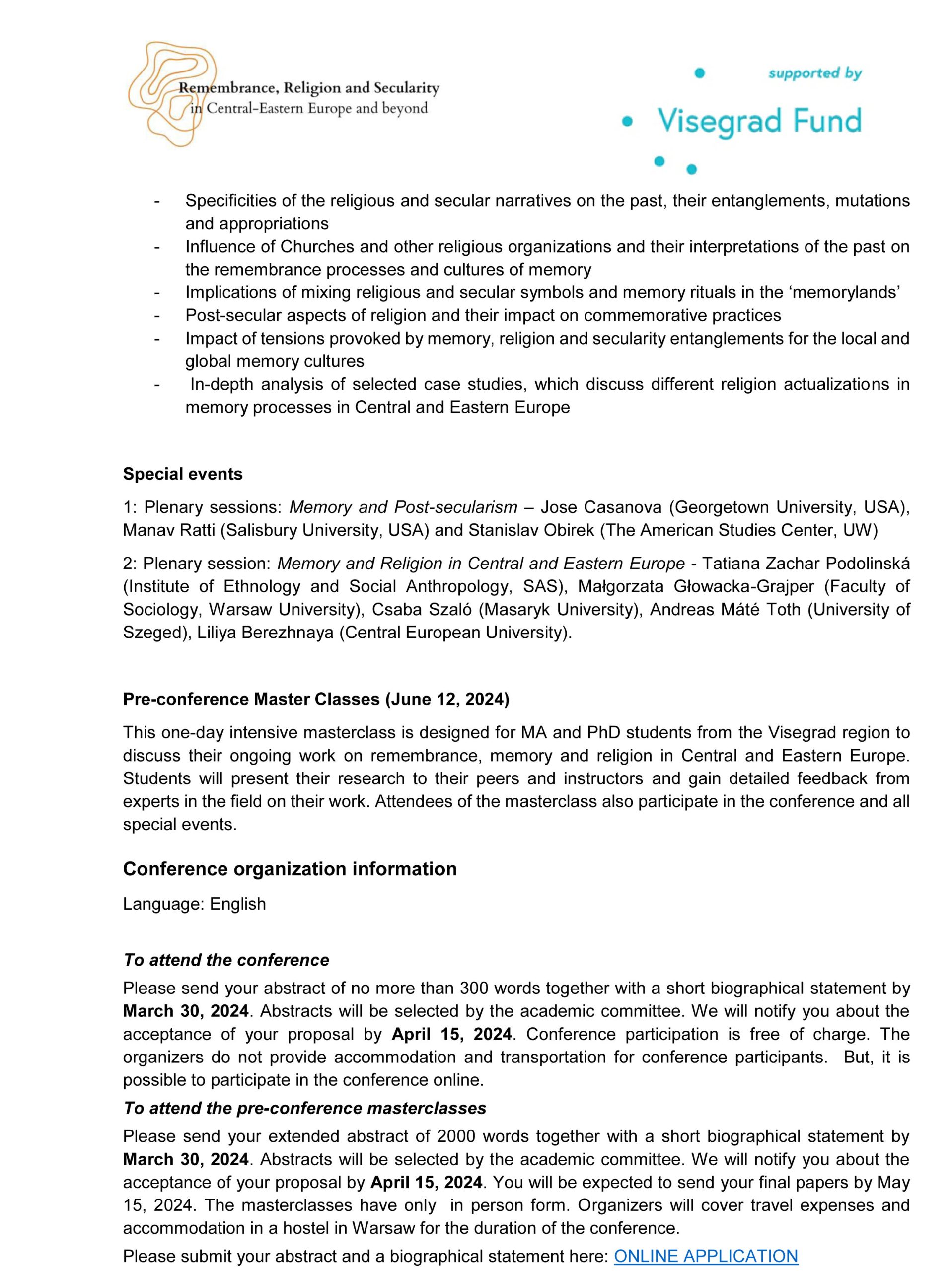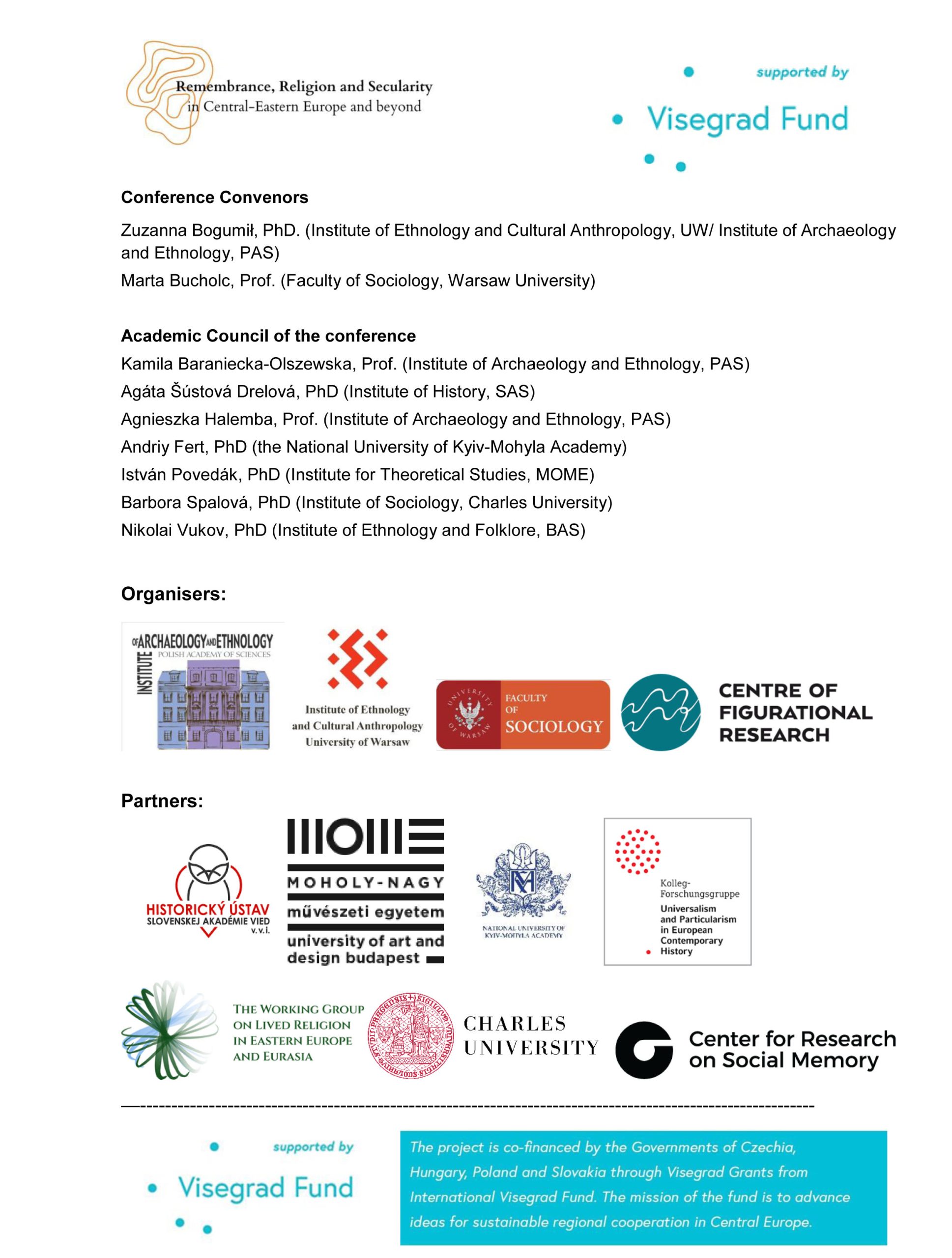Zaproszenie do udziału w konferencji “Remembrance, Religion and Secularity in Central and Eastern Europe and beyond” – 13-15 czerwca 2024 r.
Call for Papers
Remembrance, Religion and Secularity in Central and Eastern Europe and beyond
Remembrance, Religion and Secularity in Central and Eastern Europe and beyond
June 13-15, 2024, Warsaw
with
Pre-conference Masterclasses for MA and PhD students, June 12, 2024, Warsaw
This conference aims to discuss how religion mobilizes and is mobilized in memory work, and how it affects remembrance processes in Central and Eastern Europe and beyond. Even a cursory look at the European ‘memorylands’ shows clearly that the tension between religion and the secular is part of a number of heterogeneous and contradictory memory projects. However, while both memory and religion in post-socialist Europe have been intensively researched, the relationships between memory, religion, and secularity deserve deeper consideration, particularly in light of the movement of the secular into the religious and vice versa; these entanglements, mutations, appropriations and translations are visible not only in the region but also beyond it.
The starting points for this conference are five general assumptions. First, secularism and religion vary in different societies and therefore require sensitive analysis that pays attention to specific historical and contemporary configurations of the societies in question. Second, the experience of forced secularization under communism, and subsequent religious revival, has resulted in religion taking an active part in the public sphere of this region, including remembrance processes. Third, post-conflict societies are prone to work through the past and thus look for various explanatory narratives, some of which are religious. Fourth, most of the post-secular theoretical concepts have been developed in the West to describe Western societies. Their applicability to post-socialist societies, therefore, requires a reconceptualization tailored to the unique cultural and historical context of this region. Finally, in addition to subordination to the Soviet Union during the communist period, the region has experienced other colonialisms, all of which have had a significant impact on its religions, secularities and memory processes. Decolonial studies, subaltern studies, and particularly postcolonial post-secular studies, which pay attention to the role of religion in decolonial processes, seem promising when combined with and as a challenge to post-socialist studies. During the conference we plan to discusses what all of these factors mean for remembrance processes and cultures of memory in Central and Eastern Europe.
The conference has evolved from the project “Post-secular approach to memory processes in Central-Eastern Europe” https://iaepan.edu.pl/post-secular-approach-to-memory.../', hosted by the Institute of Archaeology and Ethnology, Polish Academy of Sciences, and supported by International Visegrad Fund (ID 22230096, 2023-2024).
This conference aims to discuss how religion mobilizes and is mobilized in memory work, and how it affects remembrance processes in Central and Eastern Europe and beyond. Even a cursory look at the European ‘memorylands’ shows clearly that the tension between religion and the secular is part of a number of heterogeneous and contradictory memory projects. However, while both memory and religion in post-socialist Europe have been intensively researched, the relationships between memory, religion, and secularity deserve deeper consideration, particularly in light of the movement of the secular into the religious and vice versa; these entanglements, mutations, appropriations and translations are visible not only in the region but also beyond it.
The starting points for this conference are five general assumptions. First, secularism and religion vary in different societies and therefore require sensitive analysis that pays attention to specific historical and contemporary configurations of the societies in question. Second, the experience of forced secularization under communism, and subsequent religious revival, has resulted in religion taking an active part in the public sphere of this region, including remembrance processes. Third, post-conflict societies are prone to work through the past and thus look for various explanatory narratives, some of which are religious. Fourth, most of the post-secular theoretical concepts have been developed in the West to describe Western societies. Their applicability to post-socialist societies, therefore, requires a reconceptualization tailored to the unique cultural and historical context of this region. Finally, in addition to subordination to the Soviet Union during the communist period, the region has experienced other colonialisms, all of which have had a significant impact on its religions, secularities and memory processes. Decolonial studies, subaltern studies, and particularly postcolonial post-secular studies, which pay attention to the role of religion in decolonial processes, seem promising when combined with and as a challenge to post-socialist studies. During the conference we plan to discusses what all of these factors mean for remembrance processes and cultures of memory in Central and Eastern Europe.
The conference has evolved from the project “Post-secular approach to memory processes in Central-Eastern Europe” https://iaepan.edu.pl/post-secular-approach-to-memory.../', hosted by the Institute of Archaeology and Ethnology, Polish Academy of Sciences, and supported by International Visegrad Fund (ID 22230096, 2023-2024).
Submissions may be related, but are not restricted, to the following topics:
- Theoretical reflection on memory, religion and secularity with a particular focus on their entanglements in post-socialist countries
- Hybridization of methodological apparatus of memory categories with vernacular concepts coming from Eastern European national academia, but also with concepts coming from decolonial studies, subaltern studies, and post-colonial post-secular studies to better understand particularities of the memory situation of the region
- Role, place and impact of memory on re-enchantment processes in Central and Eastern Europe
- Specificities of the religious and secular narratives on the past, their entanglements, mutations and appropriations
- Influence of Churches and other religious organizations and their interpretations of the past on the remembrance processes and cultures of memory
- Implications of mixing religious and secular symbols and memory rituals in the ‘memorylands’
- Post-secular aspects of religion and their impact on commemorative practices
- Impact of tensions provoked by memory, religion and secularity entanglements for the local and global memory cultures
- In-depth analysis of selected case studies, which discuss different religion actualizations in memory processes in Central and Eastern Europe
- Theoretical reflection on memory, religion and secularity with a particular focus on their entanglements in post-socialist countries
- Hybridization of methodological apparatus of memory categories with vernacular concepts coming from Eastern European national academia, but also with concepts coming from decolonial studies, subaltern studies, and post-colonial post-secular studies to better understand particularities of the memory situation of the region
- Role, place and impact of memory on re-enchantment processes in Central and Eastern Europe
- Specificities of the religious and secular narratives on the past, their entanglements, mutations and appropriations
- Influence of Churches and other religious organizations and their interpretations of the past on the remembrance processes and cultures of memory
- Implications of mixing religious and secular symbols and memory rituals in the ‘memorylands’
- Post-secular aspects of religion and their impact on commemorative practices
- Impact of tensions provoked by memory, religion and secularity entanglements for the local and global memory cultures
- In-depth analysis of selected case studies, which discuss different religion actualizations in memory processes in Central and Eastern Europe
Special events
1: Plenary sessions: Memory and Post-secularism – Jose Casanova (Georgetown University, USA), Manav Ratti (Salisbury University, USA) and Stanislav Obirek (The American Studies Center, UW)
2: Plenary session: Memory and Religion in Central and Eastern Europe - Tatiana Zachar Podolinská (Institute of Ethnology and Social Anthropology, SAS), Małgorzata Głowacka-Grajper (Faculty of Sociology, Warsaw University), Csaba Szaló (Masaryk University), Andreas Máté Toth (University of Szeged), Liliya Berezhnaya (Central European University).
Pre-conference Master Classes (June 12, 2024)
This one-day intensive masterclass is designed for MA and PhD students from the Visegrad region to discuss their ongoing work on remembrance, memory and religion in Central and Eastern Europe. Students will present their research to their peers and instructors and gain detailed feedback from experts in the field on their work. Attendees of the masterclass also participate in the conference and all special events.
1: Plenary sessions: Memory and Post-secularism – Jose Casanova (Georgetown University, USA), Manav Ratti (Salisbury University, USA) and Stanislav Obirek (The American Studies Center, UW)
2: Plenary session: Memory and Religion in Central and Eastern Europe - Tatiana Zachar Podolinská (Institute of Ethnology and Social Anthropology, SAS), Małgorzata Głowacka-Grajper (Faculty of Sociology, Warsaw University), Csaba Szaló (Masaryk University), Andreas Máté Toth (University of Szeged), Liliya Berezhnaya (Central European University).
Pre-conference Master Classes (June 12, 2024)
This one-day intensive masterclass is designed for MA and PhD students from the Visegrad region to discuss their ongoing work on remembrance, memory and religion in Central and Eastern Europe. Students will present their research to their peers and instructors and gain detailed feedback from experts in the field on their work. Attendees of the masterclass also participate in the conference and all special events.
Conference organization information
Language: English
To attend the conference
Please send your abstract of no more than 300 words together with a short biographical statement by March 30, 2024. Abstracts will be selected by the academic committee. We will notify you about the acceptance of your proposal by April 15, 2024. Conference participation is free of charge. The organizers do not provide accommodation and transportation for conference participants. But, it is possible to participate in the conference online.
To attend the pre-conference masterclasses
Please send your extended abstract of 2000 words together with a short biographical statement by March 30, 2024. Abstracts will be selected by the academic committee. We will notify you about the acceptance of your proposal by April 15, 2024. You will be expected to send your final papers by May 15, 2024. The masterclasses have only in person form. Organizers will cover travel expenses and accommodation in a hostel in Warsaw for the duration of the conference.
Language: English
To attend the conference
Please send your abstract of no more than 300 words together with a short biographical statement by March 30, 2024. Abstracts will be selected by the academic committee. We will notify you about the acceptance of your proposal by April 15, 2024. Conference participation is free of charge. The organizers do not provide accommodation and transportation for conference participants. But, it is possible to participate in the conference online.
To attend the pre-conference masterclasses
Please send your extended abstract of 2000 words together with a short biographical statement by March 30, 2024. Abstracts will be selected by the academic committee. We will notify you about the acceptance of your proposal by April 15, 2024. You will be expected to send your final papers by May 15, 2024. The masterclasses have only in person form. Organizers will cover travel expenses and accommodation in a hostel in Warsaw for the duration of the conference.
Please submit your abstract and a biographical statement here:
Conference Convenors
Zuzanna Bogumił, PhD. (Institute of Ethnology and Cultural Anthropology, UW/ Institute of Archaeology and Ethnology, PAS)
Marta Bucholc, Prof. (Faculty of Sociology, Warsaw University)
Academic Council of the conference
Kamila Baraniecka-Olszewska, Prof. (Institute of Archaeology and Ethnology, PAS)
Agáta Šústová Drelová, PhD (Institute of History, SAS)
Agnieszka Halemba, Prof. (Institute of Archaeology and Ethnology, PAS)
Andriy Fert, PhD (the National University of Kyiv-Mohyla Academy)
István Povedák, PhD (Institute for Theoretical Studies, MOME)
Barbora Spalová, PhD (Institute of Sociology, Charles University)
Nikolai Vukov, PhD (Institute of Ethnology and Folklore, BAS)
Zuzanna Bogumił, PhD. (Institute of Ethnology and Cultural Anthropology, UW/ Institute of Archaeology and Ethnology, PAS)
Marta Bucholc, Prof. (Faculty of Sociology, Warsaw University)
Academic Council of the conference
Kamila Baraniecka-Olszewska, Prof. (Institute of Archaeology and Ethnology, PAS)
Agáta Šústová Drelová, PhD (Institute of History, SAS)
Agnieszka Halemba, Prof. (Institute of Archaeology and Ethnology, PAS)
Andriy Fert, PhD (the National University of Kyiv-Mohyla Academy)
István Povedák, PhD (Institute for Theoretical Studies, MOME)
Barbora Spalová, PhD (Institute of Sociology, Charles University)
Nikolai Vukov, PhD (Institute of Ethnology and Folklore, BAS)






